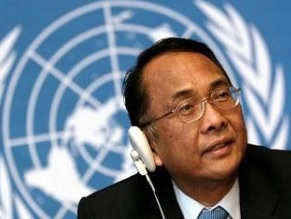|
World Jewish News

Makarim Wibisono of Indonesia Photo: REUTERS
|
UNHRC President replaces Falk with pro-Palestinian Indonesian diplomat
08.05.2014, International Organizations At the request of the United Nation’s Arab Group in Geneva, a pro-Palestinian Indonesian diplomat, Makarim Wibisono, was appointed Thursday to a six-year term as a special investigator into Israeli actions in the West Bank and east Jerusalem for the Human Rights Council.
UNHRC President Ndong Ella made a sole decision to give the post to Wibisono after disregarding the three vetted candidates put forward by a UNHRC consultative group made up of five member states.
The group’s leading candidate had been American legal expert Christina Cerna of Georgetown University, because she was a neutral candidate who had not taken a public stand on the Israeli-Palestinian conflict.
The Arab League wrote a letter of protest about her and asked that a different candidate be appointed.
In March, Ella initially recommended the second candidate on the list, British legal expert Christine Chinkin, who helped author the controversial 2009 Goldstone report on Israeli military activity in Gaza in December 2008 and January 2009.
But the issue of the mandate holder for the special rapporteur on the situation of human rights in the Palestinian territories was put on hold. Member states of the UNHRC had concerns with regard to the entire list of 19 mandate holders that were due to be appointed.
On Thursday, however, when the issue of the 19 mandate holders returned to the UNHRC, Ella set aside all three vetted candidates in favor of Wibisono. According to UN procedures, the UNHRC president has the power to do this.
Wibisono had been one of the ten candidates who initially applied for the position, which for the last six-years had been held by US legal expert Richard Falk.
At Thursday’s UNHRC debate a representative of Kuwait asked Ella to explain the procedure by which the vetted candidates were set aside. “How was the name arrived at?” the Kuwaiti representative asked.
Ella responded, “You are from the Arab group, and you must know how the procedure occurred, since I carried out this procedure with your group and I did so at the request of certain members of your group.”
Ella continued, “I respected procedures by interviewing the candidates. I clarified that there were two that were not interviewed. I interviewed them. I chose the candidate who not only corresponded to the [UN] criteria but also the person who met the expectations of the concerned parties in the system.”
Ella said the issue had been gridlocked and that there were irreconcilable positions, which were erased by the Wibisono appointment.
In March, UN Executive Director Hillel Neuer had predicted that Wibisono would be appointed.
He charged that Wibisono was problematic because in the past he had “accused Israel of ‘unconscionable use of force against the Palestinians,’ ‘untenable acts of aggression,’ and of having a ‘policy of retribution against the entire Palestinian nation.’”
Neuer said that “Wibisono has referred to the ‘stark and brutal nature of the policies pursued by the occupying power,’ accused Israel of being ‘the aggressor and the perpetrator of wanton violence,’ and repeatedly minimized Israeli suffering, speaking of ‘the handful of Israelis who have died,’ and of Israel’s battle with rocket and other terrorist attacks as a ‘flimsy pretext.’”
The UNHRC has 37 rapporteurs, of which 15 are for specific countries. But Israel is the only country to which a rapporteur is permanently assigned. Its mandate focuses solely on Israeli actions with regard to the Palestinians.
By TOVAH LAZAROFF
JPost.com
|
|
